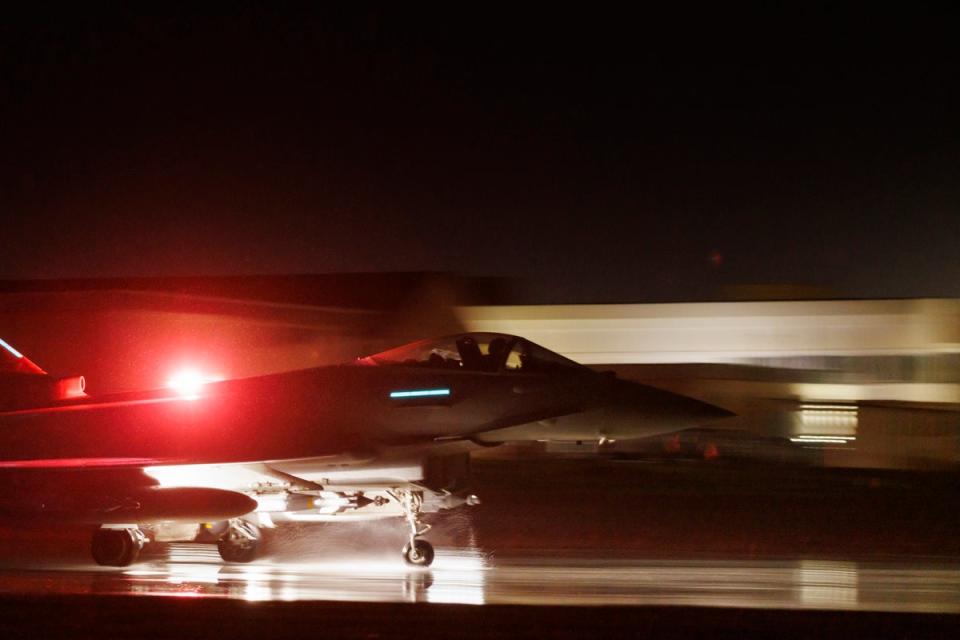UK and US launch fresh airstrikes against Houthi targets in Yemen
The UK and the US have launched fresh airstrikes against Houthi targets in Yemen.
Officials say the joint operation by British and American warplanes took out Houthi missile storage sites and launchers, in the second set of coordinated strikes against the Iran-backed militants since they began attacking international shipping in the Red Sea.
Monday night’s strikes were significantly smaller in scale than the first joint US-UK operation 10 days earlier, which hit as many as 60 different targets spanning the length and breadth of Houthi-controlled Yemen.
Despite those major strikes against the group earlier this month, ships have continued to be targeted along the vital Red Sea and Gulf of Aden trade routes. The Houthis initially said they were targeting vessels linked to Israel in solidarity with the Palestinians suffering in Gaza, and have since expanded their missile attacks to include British and American ships.
In a joint statement, the governments of the US, UK, Bahrain, Australia, Canada and the Netherlands said the “precision strikes” were “intended to disrupt and degrade the capabilities that the Houthis use to threaten global trade and the lives of innocent mariners”.
US Central Command also said the strikes targeted “areas in Houthi-controlled Yemen used to attack international merchant vessels and US Navy ships in the region,” including such specific targets as “missile systems and launchers, air defence systems, radars, and deeply buried weapons storage facilities”.
The joint airstrikes follow a telephone conversation between prime minister Rishi Sunak and US president Joe Biden on Monday evening, with the two leaders undertaking to “continue efforts alongside international partners to deter and disrupt” attacks by Houthis.

National Security Council spokesperson John Kirby told reporters at Monday’s daily White House press briefing that Mr Sunak and Mr Biden spoke regarding “what's going on in the Red Sea and the need for a continued international multilateral approach to disrupting and degrading Houthi capabilities”.
In addition to the joint operations with British forces, the US has also undertaken seven rounds of airstrikes on Houthi military sites, targeting air bases under the rebels’ control and suspected missile launch sites.
Grant Shapps, the UK defence secretary said: “Along with our US partners, we have conducted a further round of strikes in self-defence. Aimed at degrading Houthi capabilities, this action will deal another blow to their limited stockpiles and ability to threaten global trade.”
A separate operation in the Gulf of Aden earlier this month resulted in the losses of two US Navy special forces operators, both of whom were declared dead by the Pentagon following unsuccessful rescue efforts.
In a statement, US Central Command said the two American sailors were lost “during the boarding of an illicit dhow carrying Iranian advanced conventional weapons” that were understood to be in the process of being transferred to the Houthis.
The head of US Central Command, General Michael Kurilla, said the US mourned the loss of “our two Naval Special Warfare warriors” and vowed to “forever honour their sacrifice and example”.
Meanwhile, Mohammed Albukhaiti, a member of the Houthis’ ruling council, insisted the group will continue its attacks and defy the West.
“The American-British aggression will only increase the Yemeni people’s determination to carry out their moral and humanitarian responsibilities towards the oppressed in Gaza. The war today is between Yemen, which is struggling to stop the crimes of genocide, and the American-British coalition to support and protect its perpetrators,” he said.
Earlier, the Houthi movement had claimed responsibility for a missile attack on the American military cargo ship Ocean Jazz in the Gulf of Aden. However, the US Fifth Fleet, stationed in the Middle East, denied the attack, stating that reports of Ocean Jazz being successfully targeted were “patently false”.
The fleet asserted that naval operational headquarters had “maintained constant communication” with Ocean Jazz “throughout its safe transit”.
Additional reporting by agencies

 Yahoo News
Yahoo News 
